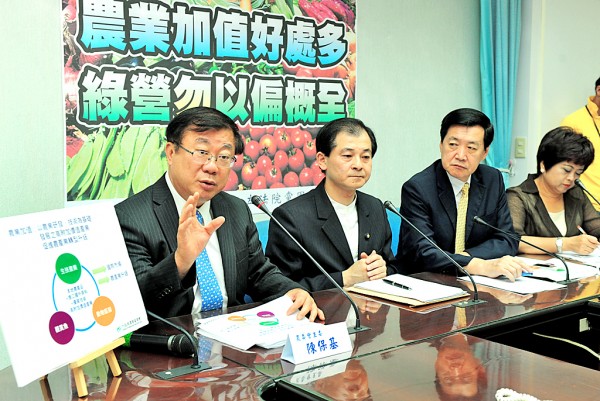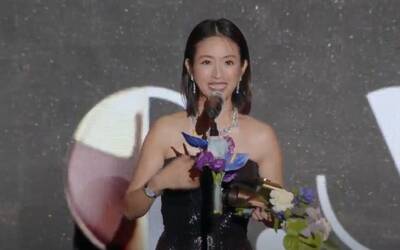《TAIPEI TIMES 焦點》Zones to expand global reach: minister

Council of Agriculture Minister Chen Bao-ji, left, and Chinese Nationalist Party (KMT) legislators hold a press conference about the proposed free economic pilot zones in Taipei yesterday. Photo: Lo Pei-der, Taipei Times
FAR-SEEING POLICY: The free economic pilot zones would help the nation’s food processing industry develop more value-added products, the agriculture boss said
By Alison Hsiao / Staff reporter
The government’s free economic pilot zone policy is not simply about lifting the ban on 830 Chinese agricultural products, but is aimed at broadening Taiwan’s global reach, Council of Agriculture Minister Chen Bao-ji (陳保基) said yesterday.
With the legislature expected to review the draft bill on the pilot zones during the last week of the three-week-long legislative extraordinary session, Chen, accompanied by Chinese Nationalist Party (KMT) legislators, called on the public and opposition lawmakers to support the policy.
Chen described the bill as a far-seeing policy aimed at enabling “Taiwan’s [food] processing techniques to shine” on the global stage.
The draft bill’s Article 42 has long been the target of criticism by civic groups and opposition parties, which contend that it would allow the import of currently banned Chinese agricultural products to the pilot zones for processing and be exported with the label “Made in Taiwan.”
Chen said that imported raw materials would be examined for food safety in accordance with existing regulations before being processed in the pilot zones. End products that fall under a restricted list can only be exported.
“The policy says nothing about sanctioning the import of banned Chinese agricultural products into the domestic market,” he said, adding that products made in the zone that are not on the restricted list would be taxed before being placed on domestic shelves.
Chen cited the local peanut butter-making industry as a potential beneficiary of the policy. He said that local makers might be forced to exit the market or move abroad if they are not allowed to process Chinese-grown peanuts, one of the currently banned Chinese agricultural products, in the pilot zones and profit from the export of “made in Taiwan” peanut butter.
The minister also underscored the notion of “value-adding,” saying that Taiwan could turn raw agricultural materials from other countries into high-priced products, “just like Switzerland’s chocolate industry and the US’ Starbucks.”
However, academics and Democratic Progressive Party (DPP) legislators have said that processors at the pilot zones could favor cheaper imported agricultural products, thus posing a threat to the domestic agricultural industry.
The DPP yesterday said that the policy would only “support Chinese agriculture” and nip Taiwanese agriculture in the bud.
National Taiwan University professor Wu Jung-chieh (吳榮杰) told a press conference in the legislature on Monday that allowing 830 types of agricultural products from China into the pilot zones would be like “punishing those factories that specialize in processing local agricultural products.”
Wu added that “value-added agriculture” would only benefit a few people.
National Chung Hsing University economist Chen Chi-chung (陳吉仲) said that peanut butter made with Chinese-grown peanuts would not be restricted from domestic sales, and it remains a problem how they would be taxed if they were labeled “Made in Taiwan.”
Taiwan Rural Front secretary-general Frida Tsai (蔡培慧) said that citing insufficient local supply as a reason for allowing agricultural imports does not hold since “there are 270,000 hectares of agricultural fields lying fallow.”
The academics demanded a public debate with the Council of Agriculture.
Chen yesterday said he was willing to accept the invitation if the party caucuses call one.
新聞來源:TAIPEI TIMES
















